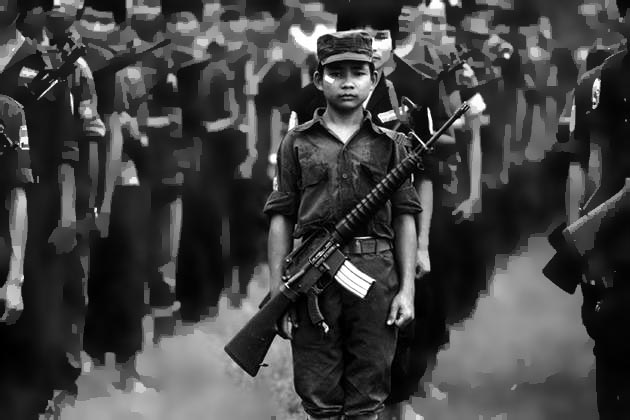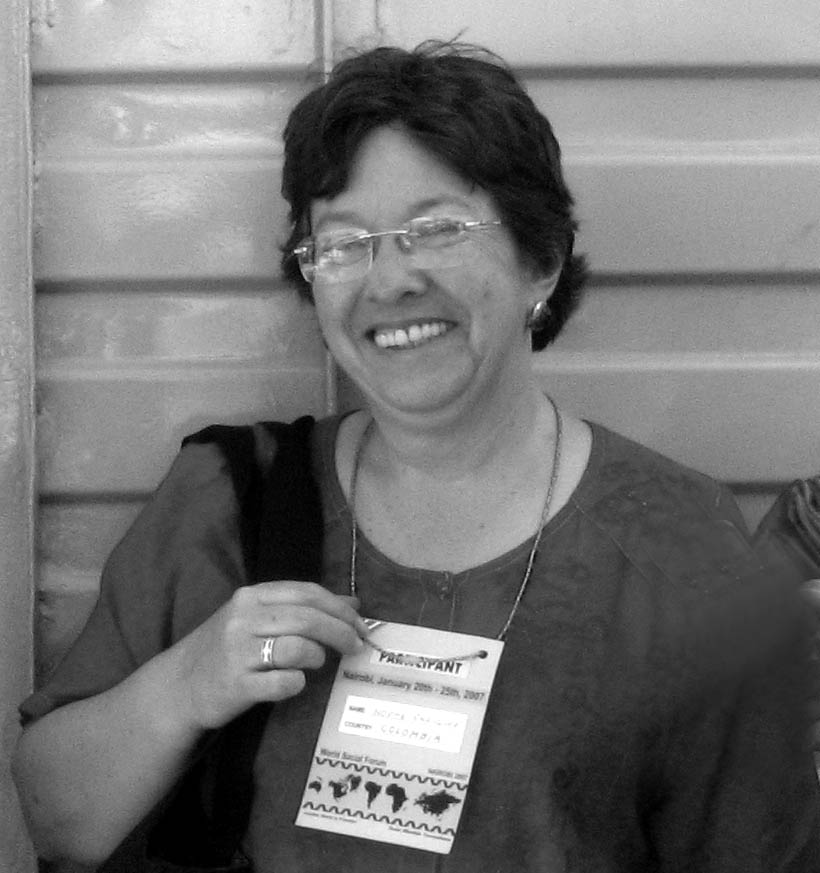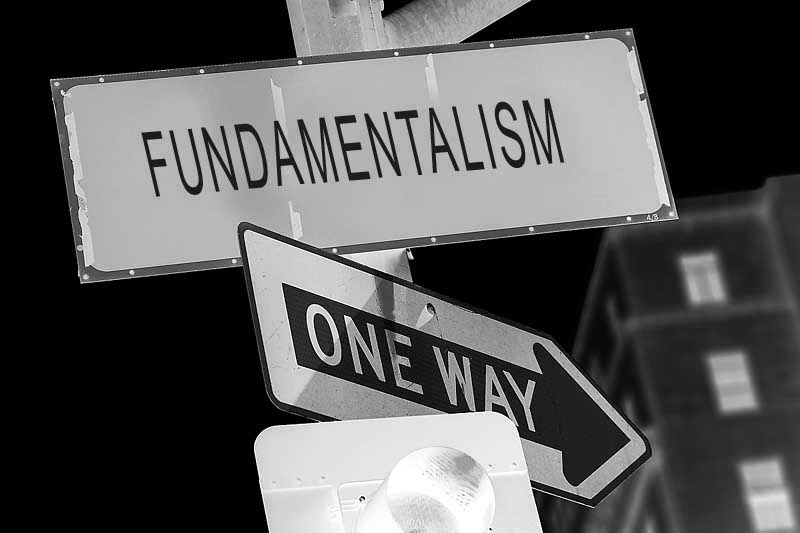Fundamentalisms: A Real Threat
As feminists gathered around the Feminist Dialogues, we have initiated a series of reflections around “fundamentalisms.” The opportunity to communicate with other feminist organisations encourages us to continue debating and deepening our reflections on this topic.
Reflections and feelings were shared wholeheartedly in the past dialogue while we grappled with our understanding of fundamentalisms and how they affect our lives. Once again we want to take up some expressions that suggested themselves as intensely in the internal debate as in the Controversy Dialogue carried out in the 2007 World Social Forum in Nairobi, Kenya.
How do fundamentalisms perceive feminism?
The key ideas that fundamentalisms hold leave no room for alternatives and other possibilities. They are presented as unquestionable and are imposed through political power, using all sorts of mechanisms to coerce people into believing one solitary truth, which could be of a religious, political, economic or doctrinal character.
To annihilate the opposition that could give rise to these “truths,” one uses the privilege of coercion and of violence, recurring with the ease of access to force and arms. For the fundamentalists, those who do not submit themselves should be eliminated for they are considered enemies. The possibility of dialogue informed by the understanding that there are multiple valid points of view, the conviction that we all are different and that persons and common people have the right to develop their personal life’s works, individually or collectively in the dimensions that they desire, is unthinkable for fundamentalisms.
The hegemonic Western powers have tried to make Islam appear as one fundamentalist proposal and as the only fundamentalism that faces the world at present. Nevertheless, assuming the definition of sole and incontrovertible truths that were imposed by force and that condemn alternatives, we, feminists have detected in both North and South other fundamentalisms that affect and define our lives. These fundamentalisms cut our freedoms. In the religious sphere, various systems of belief impose more than just tenets of faith, through the use of obligatory laws, sanctions and prohibitions accomplished thanks to political power that fundamentalists wield. This power permits the breaking down of existing barriers between religious practices common to the believers that are products of their convictions and obligations. This power takes the form of laws and precepts, for those who do not share those beliefs.
as the only fundamentalism that faces the world at present. Nevertheless, assuming the definition of sole and incontrovertible truths that were imposed by force and that condemn alternatives, we, feminists have detected in both North and South other fundamentalisms that affect and define our lives. These fundamentalisms cut our freedoms. In the religious sphere, various systems of belief impose more than just tenets of faith, through the use of obligatory laws, sanctions and prohibitions accomplished thanks to political power that fundamentalists wield. This power permits the breaking down of existing barriers between religious practices common to the believers that are products of their convictions and obligations. This power takes the form of laws and precepts, for those who do not share those beliefs.
Freedom of religion is threatened—one that allows the possibility of adopting or not adopting a system of practices and religious beliefs. This is one of the recognised fundamental freedoms in the declaration of universal human rights, yet it is being seriously threatened in great parts of the globe. In the Middle East, Islamism is imposed by fundamentalist governments in a way that impacts the lives of women in many surprising dimensions. In Asia, Hinduism is also recognised as an imposition for a great number of Asiatic women and in the North, Catholicism works in practically the same repressive way.
In Latin America, the Catholic church hierarchy in alliance with the most reactionary political forces, has succeeded in converting their notions of faith into law, creating grave damage to life, to health and, especially, to the lifework of women. By condemning modern contraceptive methods and abortion, by its ideas of a “correct” sexuality, by its misogyny and its homophobia, the church has contributed to the persistence of women’s subordination, to the poorest women’s high rates of mortality and sickness, and to the exclusion of lesbian and gay couples whom they stigmatise. All these produce serious risks to the fundamental rights of every person.
The states that are obliged to offer well-being to its citizens are now gradually ceding their responsibilities in favor of the market.
There is a clear insistence among feminists that although the fundamentalisms affect the lives of every human being, their patriarchal expressions make women suffer the worst consequences. Fundamentalisms are clearly antidemocratic to women.
But other fundamentalisms also exist and many times act hand in hand with them. We, feminists, have identified and want to emphasise these fundamentalisms that do not admit of alternatives and that seek to impose themselves in a destructive manner. These are economic fundamentalism that is expressed through the market (in neo-liberal capitalist globalisation), and militarism.
 Economic fundamentalism has reduced social and political relations to mere monetary relations, undermining laws and nations. The states that are obliged to offer well-being to its citizens are now gradually ceding their responsibilities in favor of the market. Citizens have become clients and state laws no longer impartially command but have become like merchandise, at the reach of whoever has the money. The citizenry for which women have fought so dearly are no longer a source of laws. Only money obtains for them education, health, and other goods converted as commodities for sale in the market.
Economic fundamentalism has reduced social and political relations to mere monetary relations, undermining laws and nations. The states that are obliged to offer well-being to its citizens are now gradually ceding their responsibilities in favor of the market. Citizens have become clients and state laws no longer impartially command but have become like merchandise, at the reach of whoever has the money. The citizenry for which women have fought so dearly are no longer a source of laws. Only money obtains for them education, health, and other goods converted as commodities for sale in the market.
The prophets of neo-liberal globalisation assert there is no alternative. That the progress of the market and its monopolisation of all spaces of social life are unstoppable, that “there is no looking back”. They impose their hegemonic power to destroy any kind of production that is not capitalist. They consider the market the prime regulator of social relations and allow market interests to prevail over human necessities. Politics and governments placed at the service of international capital make smooth the way so that neo-liberal globalisation could penetrate all corners of the earth without friction.
Other fundamentalist visions reinforce militaristic convictions that led George W. Bush and Tony Blair as heads of transnational capitalism, to impose the idea that the world can only be safe through the use of arms.
Other fundamentalist visions reinforce militaristic convictions that led George W. Bush and Tony Blair as heads of transnational capitalism, to impose the idea that the world can only be safe through the use of arms. The irrational militarisation course that developed during the Cold War, seemingly overcome, has been reborn with more zeal. In the “democratic west” it has advanced rapidly through fear.
Militarism has militarised civil life; now, the unquestioned order; now, habitual concession to the use of force and coercion. Those who possess power cannot tolerate contestation. Messianic leaders proliferate in all the continents; terror created by fevered imaginations is easily grafted in the analysis of those seen as poor, of those seen as different, of those who search for alternatives to war, to militarism, or those who believe or think in different ways. Those who think differently and give preference to human life and the planet over the demands of the market and the use of arms—all are potential enemies and should be eliminated.
Security interests are privileged over respect of laws of others. Proclaiming that they defend rights, fundamentalisms do not hesitate in violating everything. To destroy the “enemy” is worth the effort to reduce, overcome, negate or disregard the fundamental rights of certain people and/or places.
 Fundamentalisms are therefore the exaggerated and absolute face of the patriarchy. They are the armies of domination in their maximum expression based on irrational obedience, in the terror before the punishment, in the absence of alternatives. We, women, who have lived in subordination and in exclusion, cannot subject ourselves to this deception. Our belief in respect for differences, for co-existence in plurality, of sisterhood, in equal opportunities for everyone, goes a long way, the other way. Because of this, before religious fundamentalisms we cry out for secular states; before neo-liberal globalisation we call out to a resistance against consumerism and against the transnationals that infringe the laws of the land and of the planet. We cry out for the empowerment of alternative economies. Before war and the militarisation of civil life, we opt for dialogue, for negotiated solutions, for disarmament, for the creation of opportunities for all humanity and the equal distribution of income. We declare that our bodies and our lives are not possessions of the state, nor of religions, or of the market, or of warriors. Our bodies and our lives belong to us and we fight to rule our destinies.
Fundamentalisms are therefore the exaggerated and absolute face of the patriarchy. They are the armies of domination in their maximum expression based on irrational obedience, in the terror before the punishment, in the absence of alternatives. We, women, who have lived in subordination and in exclusion, cannot subject ourselves to this deception. Our belief in respect for differences, for co-existence in plurality, of sisterhood, in equal opportunities for everyone, goes a long way, the other way. Because of this, before religious fundamentalisms we cry out for secular states; before neo-liberal globalisation we call out to a resistance against consumerism and against the transnationals that infringe the laws of the land and of the planet. We cry out for the empowerment of alternative economies. Before war and the militarisation of civil life, we opt for dialogue, for negotiated solutions, for disarmament, for the creation of opportunities for all humanity and the equal distribution of income. We declare that our bodies and our lives are not possessions of the state, nor of religions, or of the market, or of warriors. Our bodies and our lives belong to us and we fight to rule our destinies.
Before nationalisms that invoke fundamentalisms we say: neither borders nor politics, nor geography will divide humanity. We want and we believe that another world, a better world is possible and we, feminists, are strengthening our libertarian practices, generating alliances in solidarity with all those who are excluded to recreate a better world. In that world, there is room for everyone.

This paper, originally in Spanish, was translated to English by Ma. Camilla Venezuela for Isis International-Manila.






 The
The 
 Isis Resource Center holds one of the largest feminist collections of materials in the Global South. With 40 years of publication experience, Isis holds a vast collection.
Isis Resource Center holds one of the largest feminist collections of materials in the Global South. With 40 years of publication experience, Isis holds a vast collection.